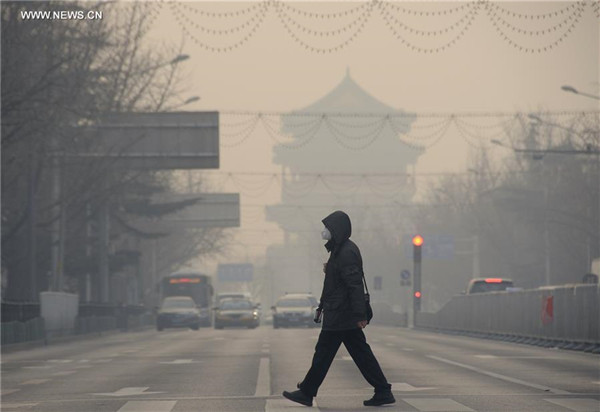Body altered by PM2.5, study finds
 |
|
A pedestrian walks amid heavy smog in Beijing, Dec 29, 2015. [Photo/Xinhua] |
Stress hormones appear to increase; changes seen in blood components
Chinese scientists have discovered that exposure to PM2.5 could significantly increase stress hormones in humans, as well as cause metabolic changes in blood glucose, amino acids and lipids.
The team, led by Kan Haidong, a professor at Fudan University's School of Public Health, shed light on the prevention and treatment of diseases caused by PM2.5-fine particles 2.5 microns or less in diameter that can go deep into the lungs and cause health problems, even deadly ones.
There is considerable evidence that the tiny particles found in polluted air can damage the cardiovascular system, but it is still not fully known how they work in many parts of the human body.
The team's study appeared in Circulation, a science journal published by the American Heart Association, on Tuesday.
"We generated two conclusions from the study: Exposure to PM2.5 may lead to higher cardiovascular risk through increasing stress hormones; and indoor air purifiers are useful for protecting our health," Kan said on Thursday.
Stress hormones, such as cortisol and epinephrine, are released when the body senses a danger, resulting in an increased heart rate, blood pressure and breathing rate, and a shutdown of metabolic processes such as digestion, reproduction, growth and immunity.
The scientists conducted tests on 55 healthy college students in Shanghai, with real and fake air purifiers randomly placed in participants' dormitories.
Analysis showed that exposure to higher levels of PM2.5 led to significant increases in cortisol, cortisone, epinephrine and norepinephrine. Between-treatment differences were also observed for glucose, amino acids, fatty acids and lipids.
Scientists found significantly higher blood pressure, hormones, insulin resistance and biomarkers of stress and inflammation among individuals exposed to higher levels of PM2.5.
However, short-term reductions in stress hormones were observed following indoor air purification.
The studies were released as air quality in Shanghai is improving somewhat.
According to the city's environmental protection bureau, the average concentration of PM2.5 in the first half of this year stood at 42 micrograms per cubic meter, a drop of 22.2 percent year-on-year and a 36.4 percent reduction from 2013.
Statistics also showed that the city reported excellent or good air quality on 142 days in the first six months, an increase of 7.1 percentage points year-on-year.
He Qi contributed to this story.



























